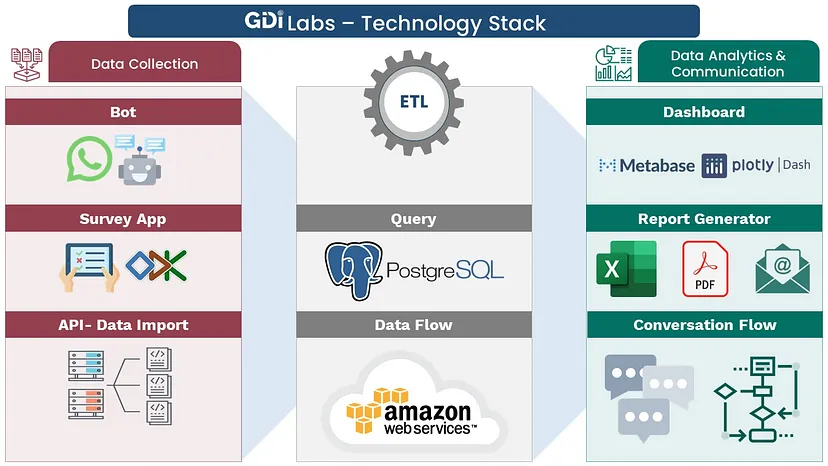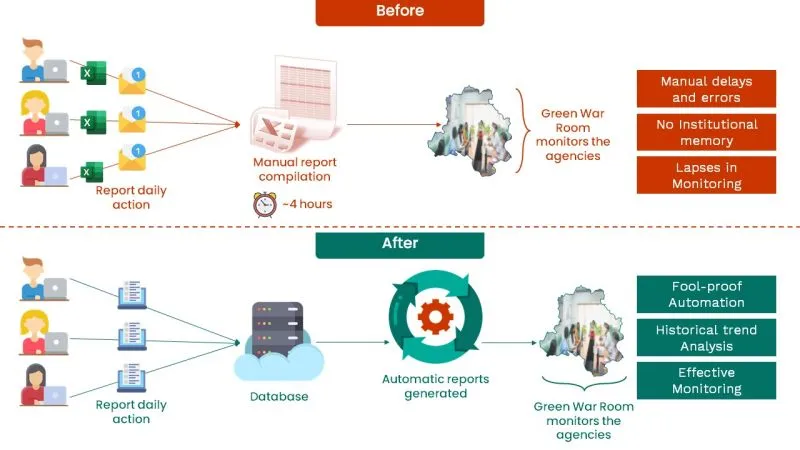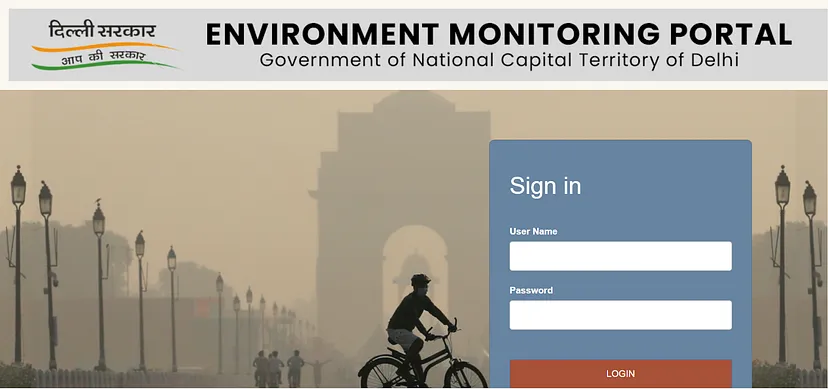Since the advent of Information Technology, Management consulting firms are increasingly setting up and leveraging technology teams. While the corporate consulting firms have begun this trend a few years back, social impact consulting firms have also caught up with the trend lately. This allowed me to utilise my technology skills to enter the social impact sector. And thus, I joined GDi Labs — the data and technology vertical of GDi Partners last year.
The following tech-stack describes what we do at GDi Labs to enable large scale social impact.
GDi Labs Technology Stack

The “Why?”
But this article is not about “What we do or what we can do?” This question is briefly answered above using our tech-stack. Since joining GDi Labs, I have been asking myself a more personal question of ‘Why’. Why is there a tech-team in social impact consulting organisation? And I answered it the following way:
GDi Labs is to leverage technology — Software, Data Science etc., in:
- Creating Innovative solutions to problems in the social impact sector, and
- Optimising existing solutions and processes by reducing time, costs and efforts needed.
Let me deconstruct it.
In many ways, governance is the downstream of technology i.e., the way we are governed is a function of the level of technology existing. For instance, in the medieval era, top-down communication was time and resource consuming (the only way to communicate was to transport people and letters). This forced the empire to give a free hand to the vassals and governors in the administration. However, this free hand led to some decentralisation and eventual disintegration of the empire. But, in the 19th century, the invention of telegraph enabled centralised governance. The British Raj could then govern India from Britain because telegraph decoupled communication from transportation. This way, technologies like printing press, telegraph, computers, internet etc., continued to affect the way we are governed.
However, since the 1990s, technological advancement has been so rapid that governments’ adoption of technology is not keeping pace with its development. One of our roles at GDi Labs, thus, is to bring such innovations to the governance sector by fast tracking the adoption of technology.
At the same time, our role is not Techno-solutionism. We are not going to say “To save the world, download this app”. There already exist brilliant social-political-cultural-managerial solutions to solve our problems. Our role is simply to make these solutions the path of least resistance, thereby more adoptable and scalable.
GDi Labs transforming Delhi Government’s Green War Room
Let me explain how we have used technology in one of our projects to transform governance. In its fight against air pollution, the Delhi Government announces a Winter Action Plan every year. This plan involves a multitude of actions to be taken by 21 civic agencies. To give a few examples — All the 5 Urban Local Bodies in Delhi need to undertake removal of dust from roads through Mechanized Road Sweeping machines. The Traffic police and Transport department need to crack down on polluting vehicles and vehicles plying without a valid Pollution Under Check certificate.
A “Green War Room” in the Environment Department of the Delhi Government monitors the performance of each of these agencies against set targets on a daily basis. Set-up in 2020, the Green War Room throughout its first year depended heavily on monitoring through email communication. 65 emails from these 21 agencies reporting their respective action taken on 13 areas of pollution reduction were received every evening. Given that agencies were free to report their action taken in any format, they would at times provide data along with narrative reports, analyzing which would be a big challenge. This data collection was then followed by a multi-hour effort everyday in compiling these emails into reports that the political and bureaucratic leadership could analyze to monitor actions by agencies and then enforce compliance to improve air quality.
The set-up was pretty much like the medieval example we discussed above — Due to the compilation of reports getting delayed due to multi-hour manual compilation, the monitoring by the leadership was not effective, and the agencies almost worked like vassals (i.e. with minimum accountability to the central leadership).
Since October 2021, we are supporting the Delhi Government in putting in place technology based processes for increasing efficiency of this daily reporting and thus improve the overall effectiveness of Green War Room’s functioning.

GDi Labs supported these efforts to improve the Green War Room’s functioning in the following way-
- As shown in our tech-stack above, we have built an open-source web-application to enable data collection in a user-friendly and faster manner. We deployed this application as “Environment Monitoring Portal” in a week’s time. This portal enables data-entry across 65 different actions to be taken by all the 21 agencies . Had the government taken the usual tendering route to hire a vendor to build this application, there would have been significant delay and costs in building it, while creating a sustained dependency on the vendor.
- We realised that the daily reports that are being manually prepared are pretty standardised (example — an urban local body provided the same information on “amount of dust collected using mechanized road sweeping machines”), which allows us to automate them. Through basic language processing and excel libraries on Python — we could create these daily reports with zero manual effort.
- Finally, we automated the communication. At 12:30 PM every day, the Green War Room of the Delhi Government now receives a single email with reports of all the actions taken by 20 departments attached. This is supplemented by a dashboard to visualise these actions as a trend over time so that any dip in performance on a given day or sequence of days can be immediately identified and flagged..
- We are also writing algorithms to detect possible frauds or inconsistencies in reporting. An example of this includes agencies filling in the same data everyday (yes, this happens). Similar algorithms to send reminders to agencies in case of delays in reporting the data, and to enforce accountability and protect data integrity.

This way, by leveraging web-applications, data science and automation we attempted to improve governance processes, which would lead to better and swifter action being taken by the government leadership, and eventually lead to an improvement in air quality.
Technology, Creativity and Species Essence
Philosophically, there is another aspect that defines my role and drives me. A good use of technology always creates space for creative energies of people, by reducing the dull and boring tasks. The automation exercise described above has saved at least 30 hours of manual work per week for the personnel in Green War Room. Many more hours for the data operators of the 21 civic agencies. Saving this time by automating the process generates an immense potential to use this time more creatively in the management of air pollution. The personnel in Green War Room can now spend this time on-ground inspections, on ensuring compliance of actions, and thinking of more ideas for the future.
I’ve also seen many people entering the social impact sector for all the glamour it exhibits and then being disheartened by the daily grunt of repeated manual actions that it requires. However, it should be kept in mind that technology can help reduce this daily grunt and thus create space for all their creative expressions in solving public problems. And people do beautiful things when they are creative.
This is one of the ways in which we could transform governance through technology. There are many more areas in the social impact sector where technology can play a huge role in — (i) Innovating new solutions to problems and (ii) Optimising existing solutions and processes by reducing time, costs and efforts needed.
I would be glad to engage with engineers, product managers and data analysts to find and work on more ways to create impact through technology. Please comment or reach out to me at saikrishna@gdipartners.in to discuss how engineers can create impact!